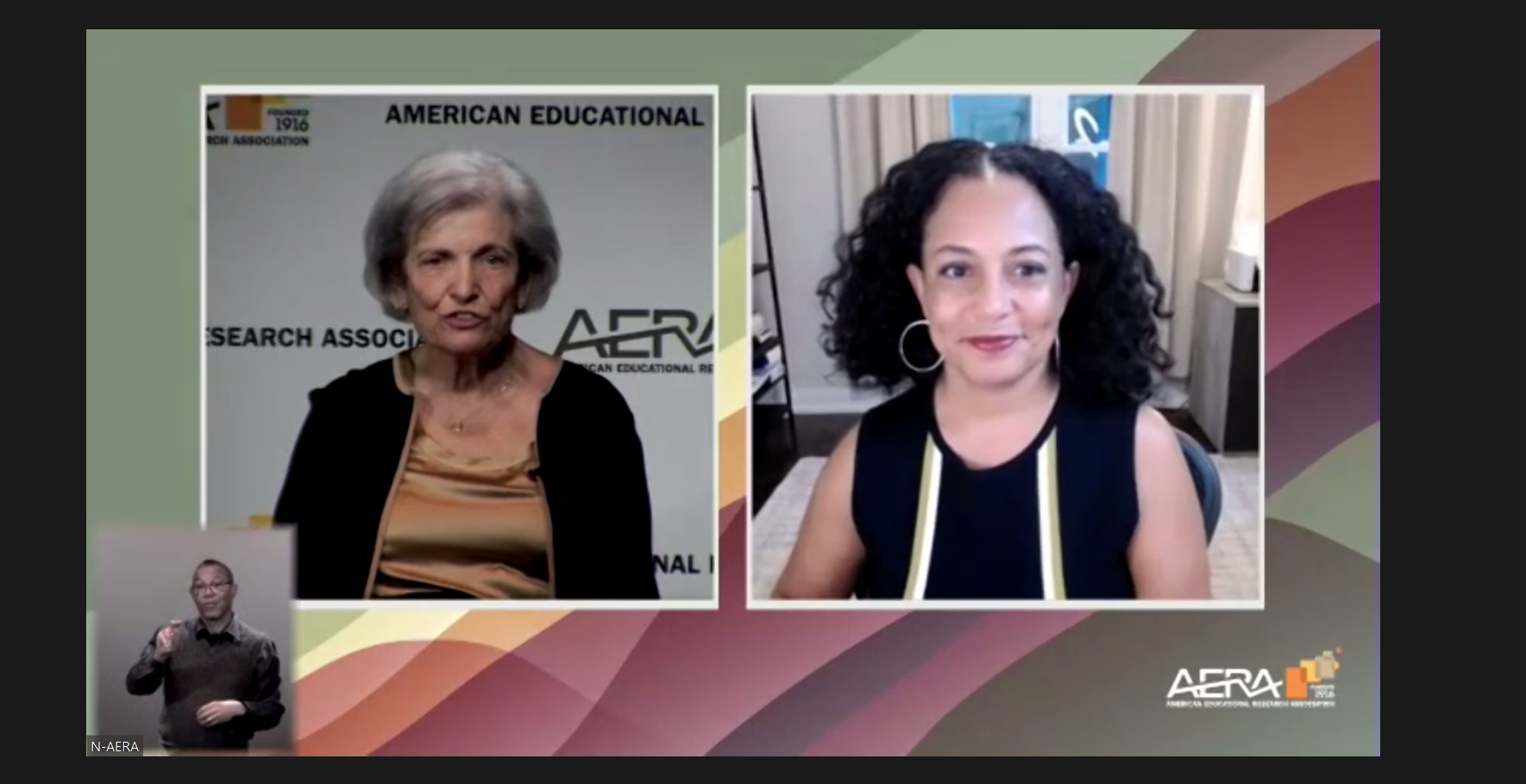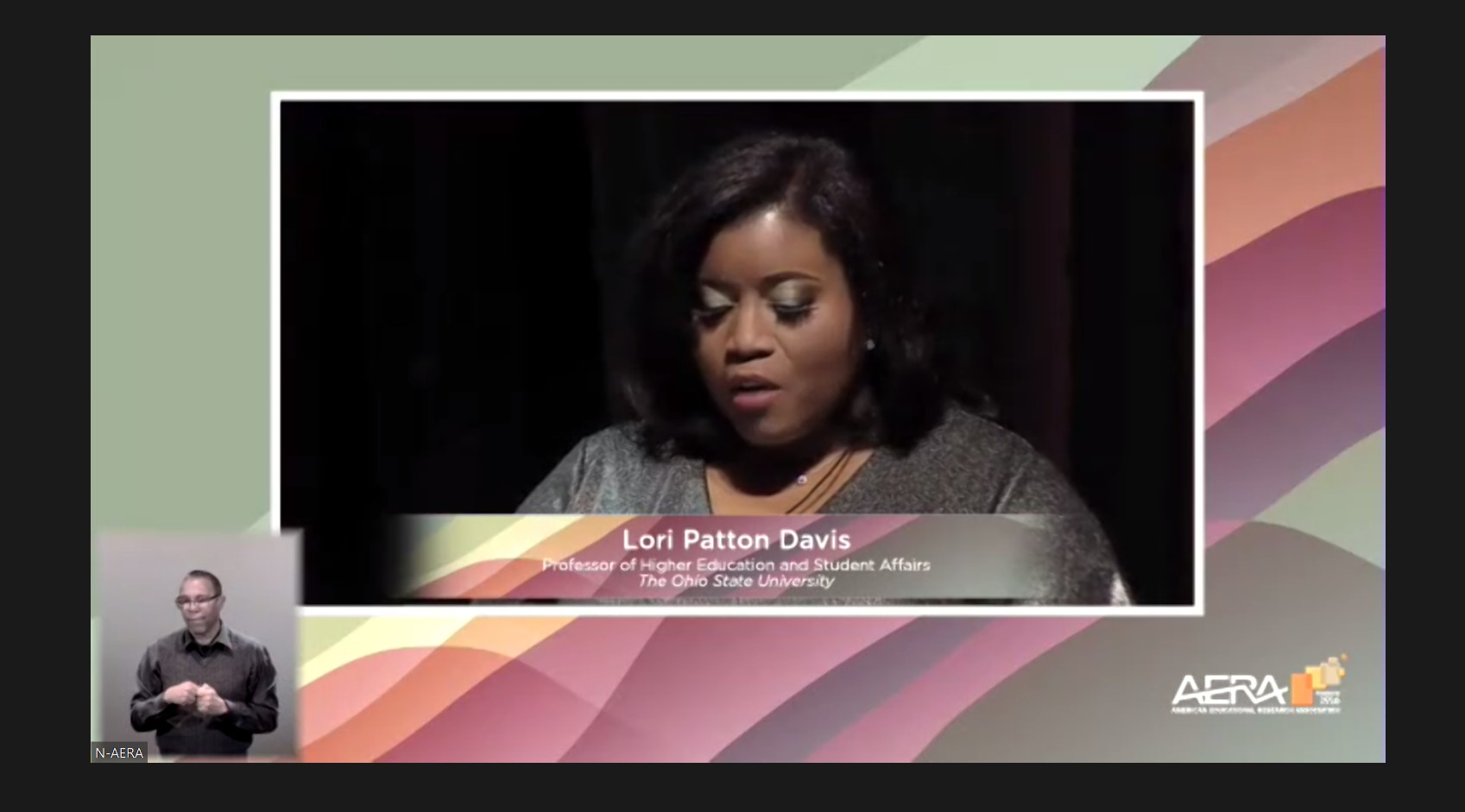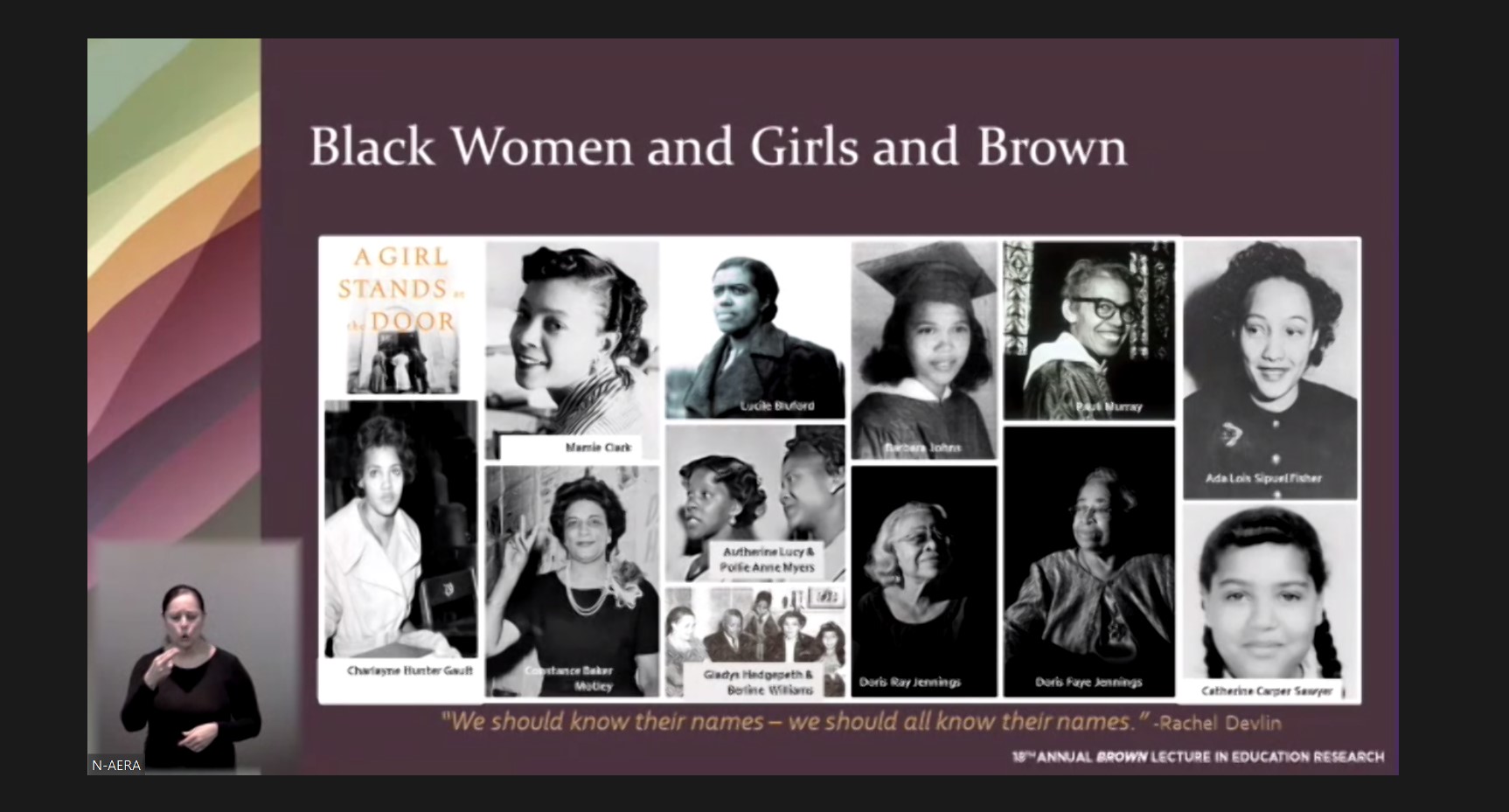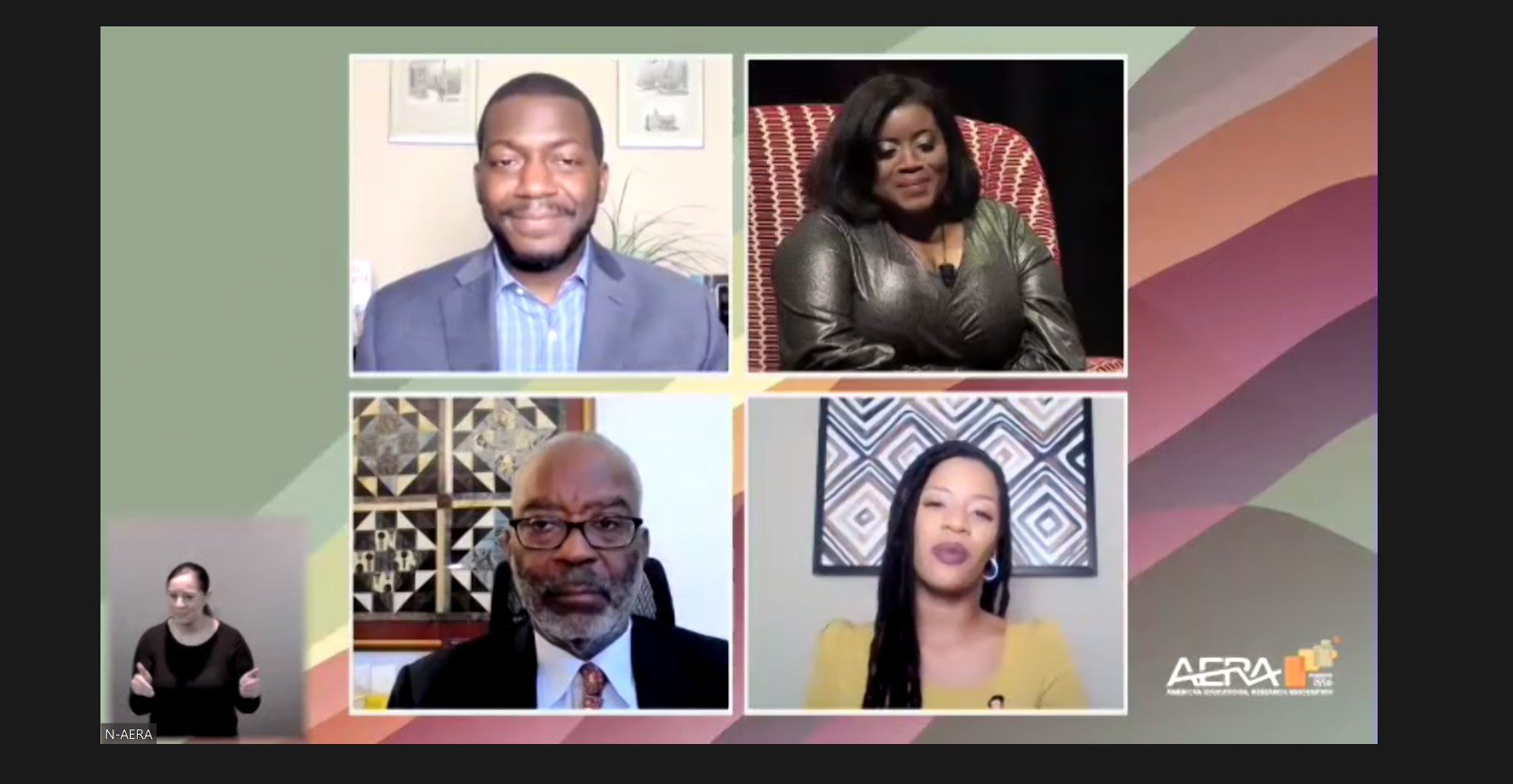October 2021
On October 21, Lori Patton Davis presented the 2021 AERA Brown Lecture in Education Research, “Still Climbing the Hill: Intersectional Reflections on Brown and Beyond,” to an audience of more than 2,200 viewers from 36 countries.
Patton Davis’s 40-minute talk was immediately followed by a moderated discussion forum and audience Q&A. She was joined by moderator Adam Harris (The Atlantic) and commentators Walter R. Allen (University of California, Los Angeles) and Kayla C. Elliott (The Education Trust).
Patton Davis, professor of higher education and student affairs at The Ohio State University, is an influential scholar known for her cross-cutting research on African Americans in higher education, critical race theory, diversity initiatives on college campuses, Black girls and women in educational and social contexts, and college student development.
AERA Executive Director Felice J. Levine opened the broadcast.
“Just as the past 18 months have led us to transformations and the need to explicitly confront inequities and systemic racism, the field of education research is also transforming; tonight’s lecture will bring evidence of that transformation,” said Levine. “Issues that were not recognized at the time of the Brown Supreme Court decision will be explored bravely, honestly, and transparently by our speaker and during our discussion forum.”
 |
Felice J. Levine and Na’ilah Suad Nasir
(Bottom left-hand corner: ASL Interpreter) |
AERA President Na’ilah Suad Nasir then introduced Patton Davis.
“We are honored tonight to be able to learn from Dr. Patton Davis’s knowledge and insight as she examines why we are still climbing the hill of educational equity 67 years after the Brown decision,” Nasir said. “Given the persistent challenges we face with injustice, racism, and oppression in our world and in our education systems, higher education institutions, and communities around the country, it is timely that we have the opportunity to hear from our distinguished colleague.”
In her lecture, Patton Davis provided an intersectional analysis of the Brown decision and its legacy that challenged prevailing narratives surrounding the renowned case.
She quickly set the stage for the evening by noting that hers would be “a dangerous lecture. Not the kind that will bring ease or gratification. This lecture will not make you feel comfortable. … It is dangerous, because it threatens the paradigms we typically use to understand education. It harkens us closer to the realization that, perhaps, Brown v. Board of Education was not the celebratory moment we wished it to be.”
Drawing on the metaphor of having to climb the tallest hill in the world for the rest of one’s life, Patton Davis provided a vivid picture of the historical and ongoing obstacles that face racially minoritized groups as a result of racism and White supremacy.
 |
Lori Patton Davis
(Bottom left-hand corner: ASL Interpreter) |
“Brown v. Board of Education marks a critical point on our metaphorical hill, where we experienced hope in what otherwise appeared to be a hopeless climb,” said Patton Davis. “Brown elicits, for some, feelings of victory and triumph for equality in education. Brown is positioned as a cure. It was not a cure, nor did it fully address societal ills promulgated by Jim Crow, especially in education.”
Patton Davis detailed three missing narratives from the Brown discourse, beginning with the importance of the higher education context.
“Higher education is rarely if ever in our collective consciousness with regard to Brown, but the fight for desegregation in higher education paved the way for Brown,” said Patton Davis, citing six key higher education desegregation cases that preceded Brown.
Today, Patton Davis, added, “The fight for equity in higher education continues over desegregation and affirmative action in college admissions. More disheartening is that public HBCUs have been owed funding dating back to the 1800s; millions of dollars. This is how racism and White supremacy—the hill—operates, creating a network of obstacles that wear on our collective hope of any justice or progress.”
She then turned her attention to the second missing narrative: the role of Black women and girls in the Brown decision.
 |
Slide from Patton Davis's Lecture
(Bottom left-hand corner: ASL Interpreter) |
Patton Davis explained the crucial role of women and girls as plaintiffs in Brown and other desegregation cases and as activists and legal scholars.
“As much as we hear about Charles Hamilton Houston and Thurgood Marshall, any understanding of Brown is incomplete without Black women and girls,” Patton Davis said. “When we speak of Brown without significant mention of Black women and girls, we not only diminish their contributions, but we subject them to wholesale erasure.”
Patton Davis then addressed the third—and perhaps most challenging—missing narrative: the idea that Brown was not a remedy to desegregation and racism.
Comparing the conditions necessary for the spread of COVID-19 to systemic racism, Patton Davis said, “Racism and White supremacy mimic the structure of a health pandemic by killing, demoralizing, and delivering harm.”
“Let’s think about racism and White supremacy as a dangerous, contagious virus, but one far more powerful than COVID-19,” said Patton Davis. “The most dangerous strands have resulted in the outright deaths of many people. Most would argue progress, in that our conditions are better now than in the past. But are they better?”
Rather than thinking of Brown as a vaccine against the virus of racism and White supremacy, Patton Davis said we might think of it as a booster shot. “However, boosters aren’t enough to get us up and over the hill or to develop herd immunity,” Patton Davis said.
Patton Davis offered six recommendations for how education researchers can fight for the racial and educational equity envisioned in Brown. These include adopting an activist/racial realist stance; embracing the power of anger; reimagining Whiteness; asking different questions; learning from historically Black colleges and universities and giving them what they are owed; and being more conscientious and reflective.
“I don’t know that in this lifetime the promises of Brown and the larger struggle for civil rights will ever materialize, but I’m prepared to fight and committed to being a light during the darkest moments on the hill for my family, my children and my community,” concluded Patton Davis. “You can also be a light.”
 |
|
Top row: Adam Harris and Lori Patton Davis
Bottom row: Walter R. Allen and Kayla C. Elliott
(Bottom left-hand corner: ASL Interpreter)
|
The discussion forum that followed included Patton Davis in an engaging dialogue introduced by Harris, who covers education and national politics at The Atlantic. Walter R. Allen, the Allan Murray Cartter Professor of Higher Education and Distinguished Professor of Education, Sociology and African American Studies at the University of California, Los Angeles, and Kayla C. Elliott, director of higher education policy at The Education Trust, offered their reflections on the issues raised in Patton Davis’s lecture.
Elliott noted that higher education is built on centuries of exploitation of Black people and their labor. “Sale of Idigenous land as well as use of the labor of enslaved Africans have been profitable for largely primarily White institutions,” said Elliott. “Segregation was profitable for PWIs. Education in prisons is profitable for for-profit institutions and for-profit prisons.”
She argued that free primary education was once a bold idea and that “we need to continue to argue for bold ideas like free college, cancelling student loan debt, and holding institutions accountable for campus racial climate.”
Allen agreed that Brown continues to be a work in progress, and while some progress has been gained, far too much has been deferred. “Education is a mirror onto society,” said Allen. “Systemic racism continues to block Black access and helps maintain White supremacy.”
Levine adjourned the program, thanking those who joined virtually and encouraging them “to engage with us in the transformation that we hope will happen not only in research but in every social institution of society. This Brown event is about that, and this evening really drove that home.”